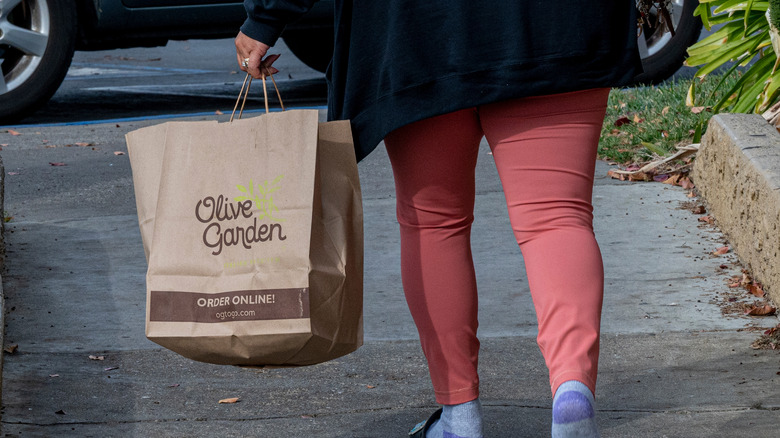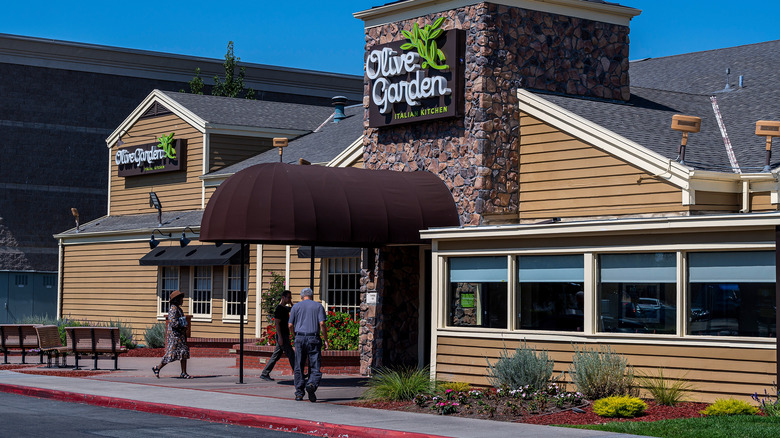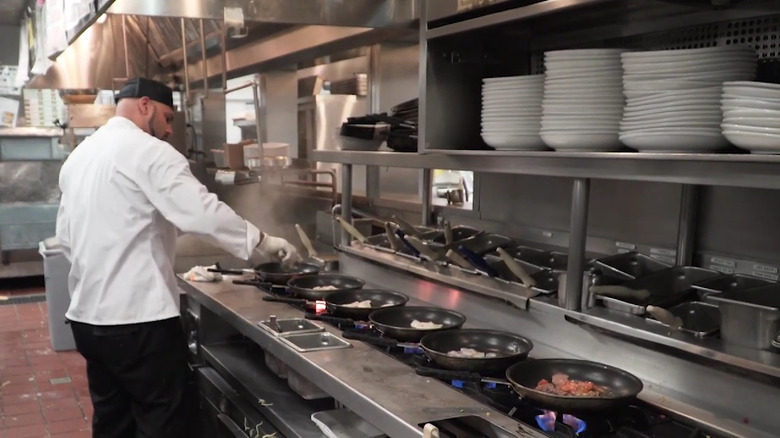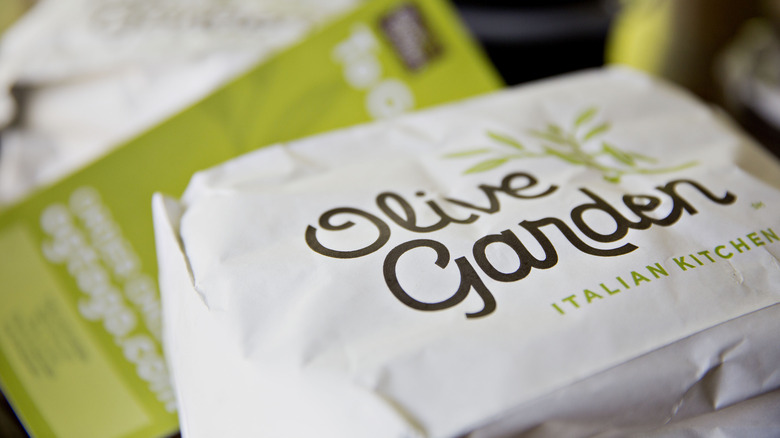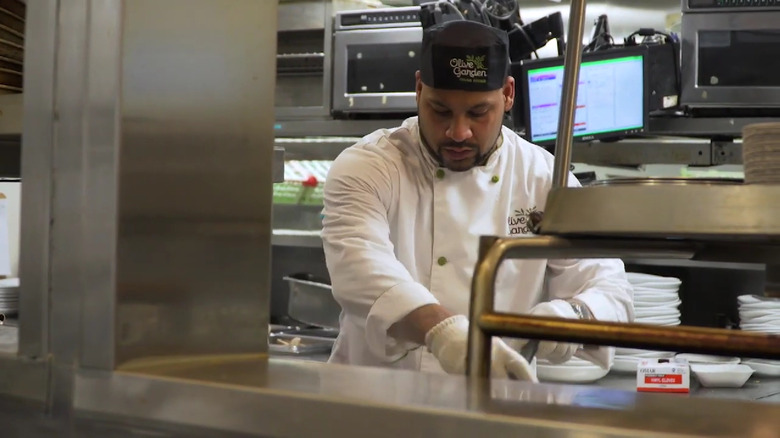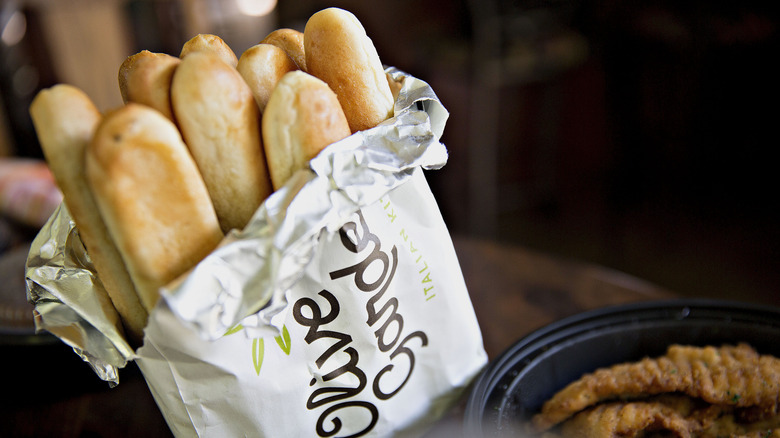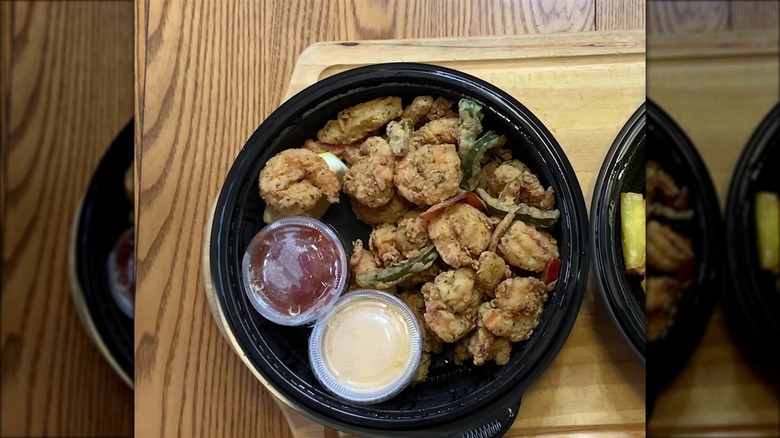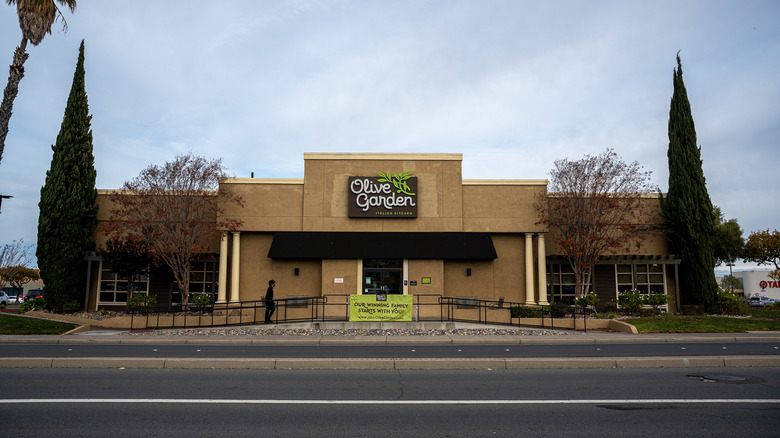What Olive Garden Doesn't Want You To Know
Olive Garden is an Italian-American restaurant chain that boasts nearly 900 restaurants across multiple countries. Known for its amicable atmosphere and comforting food, it's a brand that Americans across the nation depend on when looking for an affordable and reliable meal. The brand's impressive recent performance evidenced this: 2023 saw Olive Garden pass the $5 billion sales mark for the first time ever. According to Statista, the annual average sales total of each Olive Garden restaurant also reached $5.5 million.
While these numbers are being rightfully celebrated, record sales totals do not mean everything is well at Olive Garden. In fact, the brand and its parent company, Darden Restaurants, have been embroiled in multiple scandals over the years — these range from accusations of discriminatory payment policies to horrific items found in the restaurant brand's food. So, while sales may be on the up, Olive Garden's reputation looks in danger of going down.
A customer claimed he found a rat's foot in his soup
Thomas Howie was enjoying a bowl of minestrone soup at an Olive Garden in Warren, Detroit, when he felt something scrape the inside of his cheek. After spitting out his food, Howie saw what looked like a rat's paw amid the detritus. Howie described what happened next in an interview with Click On Detroit: "It was so gross and disgusting I couldn't control myself. My stomach just heaved. I threw up right in the restaurant. I was mortified. Until this happened, this was my favorite restaurant. I still can't believe it." Howie was taken to hospital, where he received treatment for the cut on his cheek and was given antibiotics.
Howie sued Olive Garden on August 18, 2023, over the incident. He is being represented by Michigan-based legal firm Gwinn Legal PLLC and is seeking up to $25,000 in damages. The case is ongoing, but Olive Garden has already refuted the claims. In interactions with Today, the brand highlighted recent inspections that had found the restaurant in question to be rodent-free. Olive Garden also indicated that the rodent's foot was too large for someone to put in their mouth without realizing it.
Olive Garden's payment policy was accused of being discriminatory
Darden Restaurants uses a payment model called sub-minimum tipped wages. In short, this payment model means Darden can pay employees less than the legal minimum wage, with the difference being made up by the employees' tips. If employees fail to make up the difference through tips, Darden is forced to pay the remainder. In effect, this means Olive Garden can pay its employees as little as $2.13 per hour.
Multiple Olive Garden employees took Olive Garden to court for this payment plan, claiming that it discriminated against Black employees as they were routinely tipped less than their white counterparts. The employees were represented by advocacy group One Fair Wage. After conducting a poll on over 200 Darden employees, One Fair Wage found that Black employees made 18% less than other employees after tips. The organization also found that female staff who were paid sub-minimum tipped wages were at an increased risk of suffering sexual harassment when compared to female Darden employees who were paid the legal minimum wage.
In August 2023, a Californian judge dismissed the case because One Fair Wage failed to show how the policy directly affected employees. This was the second time the case had been dismissed. A representative for Darden Restaurants made the following statement to People: "We have an industry-leading team member experience. Across our brands, tipped team members earn, on average, more than $20 per hour."
Olive Garden has been the site of various foodborne illness outbreaks
Over the years, Olive Garden restaurants have been the site of various foodborne illness outbreaks. The most infamous of these was a December 2006 outbreak of norovirus, which affected more than 300 people. Occurring at an Olive Garden location in Indianapolis, initial investigations saw three employees test positive for the virus. The location was temporarily closed for deep cleaning and was swiftly reopened.
During the summer of 2013, Olive Garden customers across the country were struck down with cyclosporiasis, a parasitic infection that causes diarrhea, nausea, and stomach cramping. Approximately 500 people were affected by the outbreak in states, including both Texas and Iowa. It was later reported that the cause of the outbreak was an infected salad that the company had imported from suppliers in Mexico.
Further instances of illnesses contracted at Olive Garden restaurants have been reported. The most dramatic took place at an Olive Garden establishment in Salem. A group of 13 friends ate at this restaurant in January 2013, and six subsequently fell ill. Among these six individuals was Miranda Fischer, a pregnant lady who claimed the sudden illness forced doctors into performing an emergency cesarean section on her. In response to these allegations, Rich Jeffers, a spokesman for Darden Restaurants, said to The Oregonian: "We don't have any indication that this lady contracted norovirus at our restaurant or that norovirus caused her to have a C-section. We don't have any indication of a norovirus outbreak in January 2013."
An Olive Garden manager refused to give staff time off
In December 2022, an Olive Garden in Overland Park, Kansas, made headlines for all the wrong reasons after an unnamed manager's rant went viral. The gist of the manager's message to employees was simple: if you call off sick, you will be fired. As reported by KCTV, a section of the message sent to employees read: "If you're sick, you need to come prove it to us. If your dog died, you need to bring him in and prove it to us. If it's a 'family emergency' and you can't say, too bad. Go work somewhere else."
A screenshot of the text shared to X, formerly known as Twitter, received nearly 3,000 reposts and over 30,000 likes. In a statement addressing the scandal, Olive Garden reassured customers that the manager's message was not endorsed by the company in any way. The company also announced that the manager was no longer employed by Olive Garden.
The brand did a U-turn when confronted about cutting worker's hours
One aspect of the Affordable Care Act, which was signed into law by President Obama in 2010, meant businesses that did not provide basic health coverage for full-time employees would be fined. In an attempt to avoid these fines while still not providing health coverage, Darden Restaurants trialed cutting employee hours so they were deemed part time workers.
The response to this trial was predictably negative. Faced with an uproar, Darden quickly backtracked. In a statement recorded by Politico, a spokesperson said: "None of Darden's current full-time employees, hourly or salaried, will have their full-time status changed as a result of health care reform. In 2014, all of Darden's full-time employees, including hourly, salaried and executive employees, will have access to the same insurance plan coverage."
Interestingly, the company made unprompted improvements to employee contracts during the Coronavirus pandemic. In 2020, the company announced that hourly workers would be eligible for one hour of paid sick leave for every 30 hours worked. Although paltry, this was a marked improvement from the previous agreement, which saw some 180,000 employees unable to claim money if forced out of work due to illness.
The brand's cooking practices were slammed by an investment firm
One of the more surprising reviews in Olive Garden's history came from Starboard Value, a firm that owns shares in Darden Restaurants. The firm released a scathing attack on Olive Garden cooking practices and its food in the form of a 294-slide presentation, which was released on the internet in 2014. The firm's criticisms ranged from Olive Garden not salting its pasta water to serving nonsensical menu items, including a chicken-topped vegetarian lasagne. The presentation also included a turnaround plan. Part of this plan was restructuring the company's breadstick policy, an action that Starboard claimed could save Olive Garden $5 million.
Aside from causing a stir online, the presentation did achieve something. In a meeting in October 2014, members of Starboard Value claimed every board position available at Darden Restaurants. These individuals wasted little time in implementing Starboard's plan. Less than two years later, Darden's stock had shot up by 47%. Starboard promptly sold around 40% of its Darden stock, cashing in on the company's increased value.
Some of Olive Garden's dishes contain huge amounts of salt
Olive Garden is not known for being the healthiest restaurant chain in the United States. Despite this, the nutritional profile of Olive Garden's food remains shocking. This is especially true when it comes to the sodium levels of many Olive Garden dishes. For example, the Shrimp Fritto Misto, a popular appetizer, contains a massive 5,010 milligrams of sodium per serving. This dish's unhealthy characteristics were highlighted by registered dietician Ginger Hultin to Eat This, Not That!: "This appetizer has more calories than many people consume in a whole meal and has over double the amount of sodium a person should have in a day. This salt level could be a problem for anyone watching their blood pressure."
In terms of entrées, Olive Garden's Chicken Tortellini Alfredo contains the most sodium, with 3,720 milligrams being present in a single serving. This is by no means an exceptional amount at Olive Garden; across the menu, there are 14 different dishes that contain more sodium than the Food and Drug Administration's recommended daily intake of 2,300 milligrams per day.
Darden has been accused of underpaying thousands of staff members
In 2012, a lawsuit was raised against Darden Restaurants, claiming that the company had illegally underpaid workers. Thousands of employees formed part of the lawsuit, although only two plaintiffs were named. After hearing about the lawsuit, many other employees came forward, claiming they'd been forced to work outside of regular hours without receiving the appropriate overtime pay.
Two years later, it was announced that plaintiff's bid for the lawsuit to receive class-action status had been turned down by a judge. At this point, the lawsuit represented 20,000 plaintiffs. The judge decided that such an array of employees, many of whom worked under different managers and in different companies, meant that it was impossible to say there was a company-wide policy of denying workers what they were owed. The two named plaintiffs, former servers Amanda Mathis and James Hamilton, were allowed to continue with the lawsuit.
An ex-employee criticized Olive Garden's food
In our increasingly digital world, the outing of restaurant chain secrets by employees is nothing new. However, some of the claims made about Olive Garden by a TikTok user in a series of viral videos made even the most seasoned individuals stop in their tracks. Amongst the claims made in these TikTok videos are that Olive Garden uses canned chicken in several of its dishes and that slugs were a common sight in and around the soda fountain. She even states that slugs were known to come out of the nozzle of the soda fountain and had to be swatted off before a drink was poured.
Videos posted by the same user in 2021 made several other claims about Olive Garden's food. Among these were accusations that the food was laden with microplastics and that customers regularly threw up while eating at their tables. Numerous people in the comments section have either expressed their horror at these accusations or dismissed them as scaremongering. Olive Garden itself did not provide a response to her videos.
Olive Garden admitted some dishes were far from authentic
Few people visit Olive Garden in the hopes of sampling authentic Italian cuisine. The brand is better known as the home of distinctly Italian-American dishes such as chicken Alfredo and spaghetti and meatballs. However, this hasn't stopped the brand from attempting to build an aura of authenticity, predominantly through marketing.
In 2011, it was revealed that Olive Garden had made up the names of several menu items in an attempt to make them sound more Italian. Dish names like Soffatelli and Pastachetti were used to add allure to mundane meals such as cheese-stuffed lasagna squares. However, the marketing ploy did not work out; the unfamiliarity of these names saw the dishes produce less than stellar sales. As a result, Olive Garden soon pivoted to championing more recognizable dishes like ravioli.
Given this history, it's not surprising that Olive Garden routinely receives scathing criticisms from Italians. Common complaints include a lack of seasonal ingredients and the overcomplication of simple Italian dishes like carbonara. Giovanna, an Italian who was interviewed by Trip Out while dining at Olive Garden for the first time, summarized her compatriots' views perfectly: "There is nothing remotely similar here to anything you would find in Italy."
Olive Garden's Tuscan culinary institute has been criticized
Around 2010, Olive Garden produced and aired a series of adverts that showed its cooks learning classic Italian cooking techniques at a school in Tuscany. The public's response was one of skepticism. However, it was later confirmed by CNN that Olive Garden did send around 100 members of its staff to the Culinary Institute of Tuscany each year.
Although the Culinary Institute of Tuscany sounds impressive, the location is actually a plush bed and breakfast, as Mark Jaronski, who was director of media and communications for Darden Restaurants, explained to CNN: "During the rest of the year, the property, named Riserva di Fizzano, is a bed and breakfast, complete with the Rocca delle Macie winery, a guest house, a pool and a restaurant."
In 2011, a former Olive Garden manager revealed on Reddit that these trips were more a vacation than a learning experience, with only minimal amounts of time being spent in the kitchen. What's more, this manager claimed that pre-written articles that told a different story about the experience, including made-up quotes, were sent to newspapers once the group returned from their trip.
Its food supply methods have been criticized
Olive Garden has previously been under fire for sourcing meat that was raised via poor farming practices. These included the use of gestation crates for pregnant pigs and the widespread use of antibiotics on chickens. A 2016 petition that called for Olive Garden to improve its sourcing practices formed part of The Good Food Now program and was signed by over 130,000 people. At the time, Kari Hamerschlag, a senior member of Friends of the Earth, said to The Guardian: "Darden clearly has a big impact on the food service industry and the food supply chain. It could be a leader in the industry. Instead, it has been a laggard in a number of fronts."
To Olive Garden's credit, the company did act, launching an animal welfare policy in 2019. As part of this policy, Darden Restaurants committed to only purchasing chicken raised without the use of antibiotics by 2023 and set a goal to have all its pork be gestation crate-free by 2025. The former has been achieved. However, by the end of June 2023, only around 54% of pork purchased by Darden was gestation crate-free. The company now notes that it can no longer forecast a timeline for all pork to be sourced from farms that utilize group housing, suggesting that it will no longer meet its original goal of being gestation crate-free by 2025.
